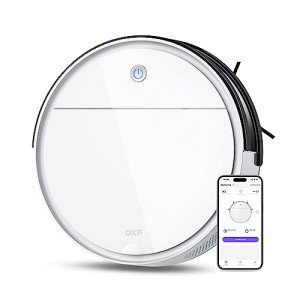The Rise of Autonomous Vacuums: Revolutionizing Home Cleaning
In the age of innovation, household chores are ending up being progressively automated, and among the most significant improvements in this realm is the autonomous vacuum. These intelligent cleaning robotics are created to relieve the drudgery of standard vacuuming, making them popular amongst time-strapped households. This post explores the evolution, performance, advantages, and limitations of autonomous vacuums, together with a comparison of a few of the leading designs on the marketplace today.
What is an Autonomous Vacuum?
An autonomous vacuum, likewise called a robotic vacuum cleaner, is a small, automated gadget that browses through your home to tidy floors without human intervention. Equipped with sensors, electronic cameras, and advanced software, these vacuums can find challenges, avoid stairs, and optimize cleaning courses. They normally run from a rechargeable battery, returning to their charging stations when their power is low or when cleaning jobs are finished.
Key Features of Autonomous Vacuums
Smart Navigation:
- Utilizes sensing units and algorithms to map the environment.
- Can browse intricate designs and avoid obstacles.
Scheduling:
- Allows users to set cleaning times.
- Can operate when your house is empty, making sure very little interruption.
Connectivity:
- Many models connect to Wi-Fi, permitting for app control and combination with smart home systems.
- Users can tailor settings, check cleaning status, and get alerts through mobile applications.
Suction Power:
- Varies in between models; some deal adjustable suction settings for different floor types.
- High-end models include powerful suction efficient in getting pet hair and deep dirt.
Floor Type Adaptability:
- Capable of cleaning carpets, wood, tiles, and more.
- Specific designs focus on tailored cleaning for numerous surface areas.
The Advantages of Using Autonomous Vacuums
1. Time-Saving
One of the most considerable advantages of autonomous vacuums is the amount of time they conserve. Rather than investing hours pressing a conventional vacuum, homeowners can set robotic vacuums to clean while they are taken part in other activities.
2. Consistent Cleaning Schedule
With the capability to schedule cleanings, these vacuums ensure that areas are frequently cleaned up, leading to a cleaner home overall. Regular cleaning assists keep indoor air quality, especially for families with allergies or asthma.
3. Smart Home Integration
Numerous autonomous vacuums can be incorporated with clever home systems for seamless operation. House owners can manage their vacuums via voice commands through gadgets like Amazon Alexa or Google Assistant, improving user benefit.
4. Compact Design
The slim profile of these gadgets enables them to clean under furniture, such as couches and beds, where standard vacuums typically can not reach.
5. Pet-Friendly
For animal owners, autonomous vacuums can be a game-changer, as they are often equipped with specialized features for getting pet hair and dander, contributing to a cleaner home environment.
Limitations of Autonomous Vacuums
In spite of their many benefits, autonomous vacuums also have constraints:
1. Minimal Deep Cleaning
While these vacuums effectively preserve cleanliness, they may not replace the efficiency of a deep tidy offered by conventional vacuums, especially for greatly soiled locations.
2. Capacity Constraints
A lot of autonomous vacuums included small dust bins that need to be emptied often, specifically in bigger homes or homes with pets. This can be a hassle for some users.
3. Navigation Challenges
Although navigation technology is continually improving, some models might fight with particular designs, particularly complicated spaces with many obstacles or extremely small spaces.
4. Cost Point
While costs have become more accessible, high-end designs can still be rather expensive, positioning a barrier for some consumers.
Contrast of Top Autonomous Vacuum Models
| Model | Smart Features | Battery Life | Suction Strength | Rate Range |
|---|---|---|---|---|
| iRobot Roomba 980 | App Control, Voice Assistant | 120 minutes | 1700 Pa | ₤ 700 - ₤ 900 |
| Roborock S6 MaxV | Advanced Mapping, Connectable | 180 minutes | 2500 Pa | ₤ 600 - ₤ 800 |
| Ecovacs Deebot Ozmo | Mopping, Smart Home | 110 minutes | 1500 Pa | ₤ 450 - ₤ 700 |
| Neato Botvac D7 | Laser Navigation, Custom Zones | 120 minutes | 2000 Pa | ₤ 800 - ₤ 900 |
| Shark IQ Robot | Self-Emptying Base, Smart Map | 90 minutes | 1500 Pa | ₤ 400 - ₤ 600 |
Noteworthy Takeaways
- Smart Features: Consumers need to prioritize models using robust clever features for convenience and efficiency.
- Battery Life: A longer battery life is useful for bigger home.
- Suction Strength: Depending on family requirements, varying suction power can significantly impact cleaning efficiency.
FAQs about Autonomous Vacuums
Q1: How do I preserve my autonomous vacuum?
A: Regular maintenance includes cleaning the brushes, clearing the dustbin, and looking for obstructions. Furthermore, keeping auto vacuum clean will assist maintain navigation accuracy.
Q2: Can robotic vacuums tidy carpets and carpets?
A: Yes, many robotic vacuums are designed to efficiently clean both tough surface areas and carpets. However, vacuum mop UK might vary based on the design.
Q3: Do robotic vacuums require Wi-Fi?
A: While numerous autonomous vacuums gain from Wi-Fi connection for app control and updates, some designs can operate separately without a cordless connection.
Q4: How typically should I run my robotic vacuum?
A: It depends on your living scenario, but running it numerous times a week is typically suggested, specifically for homes with pets.
In conclusion, autonomous vacuums represent a substantial development in home cleaning innovation, appealing convenience and performance. While these gadgets may not completely change traditional vacuum cleaners, they are certainly handy in preserving a tidy living environment. As innovation continues to progress, the future of home cleaning looks appealing, and these gadgets are at the forefront of the transformation.

